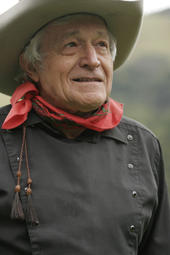Ramblin' Jack Elliott's I Stand Alone, could not be more appropriately titled. The freewheeling, well-traveled singer is one of the final archetypal representatives of America's underground folk tradition, a self-made wayfarer whose fifty-plus years of experience resonates through every tune captured here. The consummate song collector, Elliott has assembled a full deck of titles characterized by a wild mixture of graphic imagery, old time sentiment and Americana tradition, each put across with an underscoring vein of sardonic observation that reflects this ragged individualist's perpetual outsider perspective. Serving up a typically diverse collection of material, I Stand Alone visits folk pioneers the Carter Family's "Engine 143," 1940's pop genius Hoagy Carmichael's "Hong Kong Blues," and also pays calls on Leadbelly ("Jean Harlow"), Texas titan Ernest Tubb ("Careless Darling,") and comrade Tom Paley ("Call Me a Dog When I'm Gone"). His energetic guitar picking is also complemented here by some additional heat from the likes of country firebrand Lucinda Williams, David Hidalgo, and celebrated rockers Sleater-Kinney's Corin Tucker, Flea, Nels Cline, and X / Knitters drummer DJ Bonebrake.
Such a series of idiosyncratic juxtapositions could only come from Elliott, an artist whose lifelong immersion in folk music enables him to provide a singular expansion of old time traditions. Elliott's Depression-era raising was redefined after seeing Gene Autry perform at a rodeo in Madison Square Garden; a combination of guitar and livestock that set him afire; Elliott chose the cowboy way at the age of 14, trading life at home for one on the rodeo circuit. By age twenty, Elliott's rough-edged enthusiasm and musical instinct drew the attention of none other than the young singer's avowed idol, Woody Guthrie, initiating a close, invaluable and life-long association.
Guthrie's hobo-grooming completed Elliott's transformation into latter-day troubadour, one whose love for a good song was equaled only by an abiding respect for his fellowman and a profound contempt for injustice. Along the way, he inspired an army of musicians: mentoring young Bob Dylan, much as Guthrie had for Elliott (Dylan has called Jack "his long-lost father" and later featured Elliott on his notorious Rolling Thunder roadshow) ), inadvertently firing up the British Invasion (Elliott's "San Francisco Bay Blues" was one of the first songs Paul McCartney learned to play; Mick Jagger bought his first guitar after hearing Elliott busking on train platform in London), and influencing several generations of musicians, Lou Reed, Van Morrison, Mick Ronson, Kris Kristoffersen, Robbie Robertson, Bruce Springsteen and Beck.
With I Stand Alone, Elliott is ripe, forceful and ready to continue the battle. His hardbitten vocal caress, with its conversational intimacy and eccentric intonation that seems at once unbelievably world-worn yet fresh and vibrant, is a mix capable of extending the reach of any tune. Elliott's interpretations carry a strangely casual authority, one that commands empathic response. Combining beat generation intensity with understated backhills dignity, Elliott is, much as Frank Sinatra was, such a self-possessed voice that the dynamics and drive employed are consistently impressive.
Whether he's singing about the faithful canine of Cisco Houston's "Blue," or the disfiguring agony of Butch Hawes' wry lament "Arthritis Blues," Elliott hits the emotional core dead center; a trio of hardcore era Texas honky-tonk classics--"Driving Nails in My Coffin," "Careless Darling" "Remember Me"--deliver the goods with deep hillbilly soul and link post-war era commercial country together with the ever-evolving cosmology of the folk repertoire (not that it's such a cultural stretch--"Remember Me"'s T Texas Tyler enjoyed an infamous marijuana bust in the mid-1950s). As an inveterate hunter of folk song, Elliott's ultimate role is almost journalistic: deciding what is important and what is not, and a handful of pearls harvested from the public domain ocean--"Willy Moore," "Honey, Where You Been So Long," "Leaving Cheyenne"--demonstrate that his acute sensibility and encyclopedic knowledge are still being brought to bear with conspicuous effect.
Elliott's kaleidoscopic track record also brings additional dimension, an enhanced context that could only come from a performer as comfortable sharing stages with bluegrass royal Ralph Stanley as he was appearing with Manhattan rock & roll insurgents the Velvet Underground (Andy Warhol personally paid Elliott $75 for a two night stand). The mind-bending warp-and-woof of Elliott's career--encompassing beatniks, the avant-garde, merry pranksters, unreconstructed mountain musicians, country balladeers, poets and rock stars--is in itself persuasive testimony on the substance of Elliott's peerless natural instinct and hyper-progressive musical ear. All of these alliances and adventures are reflected in his music, but perhaps nowhere so movingly as on I Stand Alone's closing track, "Woody Last Ride." A rare case of first-hand Elliott composition (he reckons that he has "written maybe five songs" over the years) with sensitive accompaniment from an all star studio ensemble, the recitation is vintage Ramblin' Jack, sharply etched, clearly experiential wordplay matched by vivid emotion and private psychological information. Clearly, this songhound has plenty of hunt left in him.
Disclaimer: This page is run by Anti- Records
